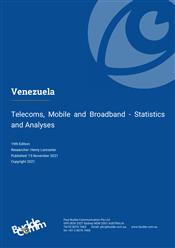Venezuela Telecoms Market Report
Telecoms, Mobile and Broadband - Statistics and Analyses

Venezuela’s economic crisis stifling the telecoms sector
Venezuela’s fixed-line teledensity was relatively high for the region before the steady growth in the number of lines came to an end in 2015. Since then, the number of lines has plummeted, and by late 2021 teledensity had fallen to about 17.3%. The cause is largely linked to the country’s ongoing economic troubles, which have compelled many people to terminate fixed-line telecom services and others still to flee the country.
The financial concerns of customers have been exacerbated by the decrepit state of much of the fixed network, which has been hampered by the difficulty for telcos and infrastructure suppliers to pay for equipment from foreign vendors. This has resulted in a poor quality of service in many areas of the country. These pressures have also distorted sector revenue and have placed into disarray operators’ investment plans aimed at improving networks and expanding the reach and capabilities of new technologies and services.
The fixed broadband penetration rate is lower than the regional average, while data speeds are also relatively low. There is no effective competition in the provision of DSL, and as a result the state-owned incumbent CANTV has had little incentive to improve services from its meagre revenue streams.
Mobile penetration in Venezuela is also below the regional average. The number of mobile subscribers fell by an estimated 2.4% in 2020, year-on-year, as subscribers terminated services in a bid to reduce discretionary spending. This decline is expected to continue into 2022, with subscriber growth not returning until 2023.
The three MNOs Movilnet, Movistar, and Digitel have also had to contend with widespread theft of equipment and with erratic electricity supply to their remaining base stations. Movistar has also been hit by currency restrictions and has depended on support from Telefónica Group to stay afloat. Nevertheless, it seems determined to remain in the market.
This report provides an overview of Venezuela’s telecom infrastructure, market, and regulatory environment, together with profiles of the major fixed-line operators. It also provides a range of statistics and market analyses. The report also reviews the fixed and wireless broadband markets, as well as the mobile market, including an assessment of key market statistics and general sector analyses on a very difficult competitive environment.
BuddeComm notes that the outbreak of the Coronavirus continues to have a significant impact on production and supply chains globally. During the coming year the telecoms sector to various degrees is likely to experience a downturn in mobile device production, while it may also be difficult for network operators to manage workflows when maintaining and upgrading existing infrastructure.
Overall progress towards 5G may be postponed or slowed down in some countries.
On the consumer side, spending on telecoms services and devices is under pressure from the financial effect of large-scale job losses and the consequent restriction on disposable incomes. However, the crucial nature of telecom services, both for general communication as well as a tool for home-working, will offset such pressures. In many markets the net effect should be a steady though reduced increased in subscriber growth.
Although it is challenging to predict and interpret the long-term impacts of the crisis as it develops, these have been acknowledged in the industry forecasts contained in this report.
The report also covers the responses of the telecom operators as well as government agencies and regulators as they react to the crisis to ensure that citizens can continue to make optimum use of telecom services. This can be reflected in subsidy schemes and the promotion of tele-health and tele-education, among other solutions.
Key developments:
- Simon Bolivar Satellite (VeneSat-1) drifts off its allocated orbital path and becomes non-operational;
- AT&T closes its DirecTV Latin America unit in Venezuela due to US sanctions, Chilean investment firm Scale Capital acquires DirecTV’s operations, aims to launch mobile services;
- Pluto TV launches ad-supported streaming platform;
- Chilean investment firm Scale Capital acquires DirecTV’s operations, aims to launch mobile services;fa
- Conatel awards new ISP licence to Conext Venezuela;
- Report update includes the regulator's market data to December 2019, operator data updates to Q4 2020, Telecom Maturity Index charts and analyses, assessment of the global impact of Covid-19 on the telecoms sector, recent market developments.
Companies mentioned in this report:
Movilnet, Movistar, Digitel, MovilMax, Tesacom, CANTV, Inter, NetUno, SuperCable, Alodiga, Multiphone, Totalcom, Convergía
Related Reports
- 2019 Latin America - Mobile Network Operators and MVNOs
- Caribbean - Telecoms, Mobile and Broadband - Statistics and Analyses
- El Salvador - Telecoms, Mobile and Broadband - Statistics and Analyses
- Argentina - Telecoms, Mobile and Broadband - Statistics and Analyses
- Guyana - Telecoms, Mobile and Broadband - Statistics and Analyses
- Peru - Telecoms, Mobile and Broadband - Statistics and Analyses
- Dominican Republic - Telecoms, Mobile and Broadband - Statistics and Analyses
- Colombia - Telecoms, Mobile and Broadband - Statistics and Analyses
- Costa Rica - Telecoms, Mobile and Broadband - Statistics and Analyses
Share this Report
TMT Intelligence
A platform to scale your intelligence tasks
Monitor critical insights with our AI-powered Market Intelligence Platform gathering and analyzing intelligence in real time. With AI trained to spot emerging trends and detect new strategic opportunities, our clients use TMT Intelligence to accelerate their growth.
If you want to know more about it, please see:
Research Methodology
BuddeComm's strategic business reports contain a combination of both primary and secondary research statistics, analyses written by our senior analysts supported by a network of experts, industry contacts and researchers from around the world as well as our own scenario forecasts.
For more details, please see:
More than 4,000 customers from 140 countries utilise BuddeComm Research
Are you interested in BuddeComm's Custom Research Service?
Hot Topics
News & Views
Have the latest telecommunications industry news delivered to your inbox by subscribing to BuddeComm's weekly newsletter.